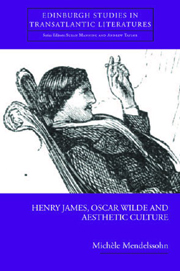Book contents
- Frontmatter
- Contents
- Acknowledgements
- List of Abbreviations
- List of Figures
- Dedication
- Introduction
- 1 ‘I Have Asked Henry James Not to Bring his Friend Oscar Wilde’: Daisy Miller, Washington Square and The Politics of Transatlantic Aestheticism
- 2 The Gentle Art of Making Enemies and of Remaking Aestheticism
- 3 The School of the Future as well as the Present: Wilde's Impressions of James in Intentions and The Picture of Dorian Gray
- 4 ‘Wild Thoughts and Desire! Things I Can't Tell You – Words I Can't Speak!’: The Drama of Identity in The Importance of Being Earnest and Guy Domville
- 5 Despoiling Poynton: James, the Wilde Trials and Interior Decoration
- 6 ‘A Nest of Almost Infant Blackmailers’: The End of Innocence in The Turn of the Screw and De Profundis
- Bibliography
- Index
5 - Despoiling Poynton: James, the Wilde Trials and Interior Decoration
Published online by Cambridge University Press: 12 September 2012
- Frontmatter
- Contents
- Acknowledgements
- List of Abbreviations
- List of Figures
- Dedication
- Introduction
- 1 ‘I Have Asked Henry James Not to Bring his Friend Oscar Wilde’: Daisy Miller, Washington Square and The Politics of Transatlantic Aestheticism
- 2 The Gentle Art of Making Enemies and of Remaking Aestheticism
- 3 The School of the Future as well as the Present: Wilde's Impressions of James in Intentions and The Picture of Dorian Gray
- 4 ‘Wild Thoughts and Desire! Things I Can't Tell You – Words I Can't Speak!’: The Drama of Identity in The Importance of Being Earnest and Guy Domville
- 5 Despoiling Poynton: James, the Wilde Trials and Interior Decoration
- 6 ‘A Nest of Almost Infant Blackmailers’: The End of Innocence in The Turn of the Screw and De Profundis
- Bibliography
- Index
Summary
The Law has taken from me not merely all that I have, my books, furniture, pictures, my copyright in my published works, my copyright in my plays, everything in fact from The Happy Prince and Lady Windermere's Fan down to the staircarpets and door-scraper of my house, but also all that I am ever going to have.
De Profundis (LW 774)‘Oscar Wilde is the fashion. His catch and whimsicality of dialogue tickle the public. Just now the whole of society is engaged in inventing Oscar Wildeisms,’ the Illustrated London News reported in January 1895. A month later, the same newspaper announced that James's unfashionable, ‘unhappily obscure comedy’ had failed. By March, it was Wilde's turn to be counted among the deeply unfashionable. His arrest, trials and imprisonment ensured the rapid decline of his popularity, even among the connoisseurs who had been his social allies and friends. James, who was neither an ally nor a friend, sought to wipe Wilde from his most public record – his fiction – in order to control and diminish any perceptible parallels between himself and ‘his friend Oscar Wilde’, as Marian Adams had acerbically put it in 1882. James may have found Adams's teasing annoying but tolerable, but he now sensed that the time for witty, overt allusions to Wilde had passed.
Publicly, James did his utmost to disassociate himself from Wilde. In the spring of 1895, when Wilde had been at the epicentre of the most famous lawsuit in homosexual history, James became an avid, almost compulsive newspaper reader.
- Type
- Chapter
- Information
- Henry James Oscar Wilde and Aesthetic Culture , pp. 197 - 239Publisher: Edinburgh University PressPrint publication year: 2007

